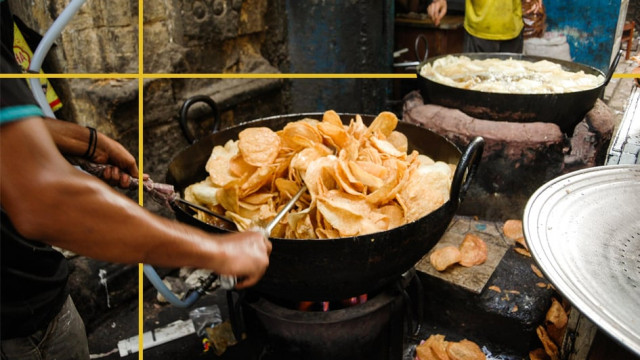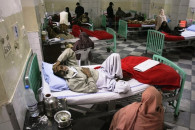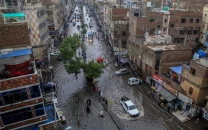Eating out: The fault in our food
This Ramazan, we take a look at the ugly side of what we eat outside our homes


 In Pakistan, gastronomic indulgence comes with a hidden cost. “Seventy per cent of the food available in the market is adulterated and 52% of mineral water available is unsafe for drinking,” says Muddassar Alam Tahirkheli, manager governance at Consumer Rights Commission of Pakistan, sharing what an insider revealed at one of the cabinet meetings. Though sale of contaminated food or beverages is an offense in Pakistan under consumer laws, Tahirkheli says most food producers continue to use substandard raw materials such as contaminated water and inferior food colours, flavours, fats and oils because there is weak implementation of laws and a virtually non-existent integrated legal framework for food safety.
In Pakistan, gastronomic indulgence comes with a hidden cost. “Seventy per cent of the food available in the market is adulterated and 52% of mineral water available is unsafe for drinking,” says Muddassar Alam Tahirkheli, manager governance at Consumer Rights Commission of Pakistan, sharing what an insider revealed at one of the cabinet meetings. Though sale of contaminated food or beverages is an offense in Pakistan under consumer laws, Tahirkheli says most food producers continue to use substandard raw materials such as contaminated water and inferior food colours, flavours, fats and oils because there is weak implementation of laws and a virtually non-existent integrated legal framework for food safety.
The contamination, however, is not just limited to the ingredients. In most cases, persons preparing the food are not wearing gloves and hairnets, and the food is prepared in dirty kitchens infested with cockroaches. “Often the food is spoiled not because of substandard ingredients, but by an unhygienic handler who is sweating profusely in a poorly ventilated kitchen while adding chillies to the gravy,” says Karachi’s chief food inspector Abdul Waheed Bhatti, who heads a platoon of 13 food examiners instead of what should ideally be a battalion of 2,000 inspectors.
 Appalling conditions of food storage are a common sight in the country. PHOTO: ARIF SOOMRO
Appalling conditions of food storage are a common sight in the country. PHOTO: ARIF SOOMROBhatti, along with a handful of comrades, travels around the sprawling mega city, snooping around kitchens for a rusty utensil or expired frozen meat. In a perfect world, we would expect Bhatti to seal a restaurant if he spots a health code violation, but unfortunately that is not the case. Food inspectors in Karachi are working under a decades-old legislation, the Pure Food Ordinance 1960, which limits their role to just filing complaints with local magistrates. “We take samples of the food and if it fails the laboratory test, we file a detailed report which is forwarded to the relevant magistrate,” Bhatti explains, adding as a consequence restaurant owners are merely fined somewhere between Rs500 and Rs3,000 for offences that could be potentially fatal, as was seen in the case of the case of 13-year-old Kanza Ahmed. The teenager passed away earlier this year after consuming a burger from Dilpasand in Karachi declared ‘unfit’ for human consumption in a test conducted four days after her death. Many raised questions about whether the food was perfectly stored before it hit the lab, but the fact remains that Kanza and her family went through an episode of stomach ache and vomiting right after consuming the meal.

Although far from ideal, the situation in Lahore is relatively better. The Punjab Food Authority (PFA) — responsible for the availability of safe and wholesome food fit for human consumption — in its annual report for 2013-14, boasts visiting 19,040 food outlets and collecting 17,649 samples against Karachi’s estimated 8,000 samples. It has issued notices to big names, while sealing 598 hotels, restaurants and bakeries. “We have a comprehensive law which covers several aspects of food safety. With 4,000 registered restaurants, action is taken against anyone found violating the food safety code,” PFA’s Deputy Director Operations Saqib Munir says as he begins to explain the organogram in place for inspection. The PFA has nine teams for every town in Lahore, each team comprising three members. “During our checks, we detected major problems with washing and storage,” he adds, explaining food handlers at most places did not have any soap to wash their hands with before and after preparing food.
 Most of the time food sold at roadside stalls is not safe for consumption. PHOTO: ARIF SOOMRO
Most of the time food sold at roadside stalls is not safe for consumption. PHOTO: ARIF SOOMROThe number of inspectors in Lahore is not much higher either but PFA units in the city have more power and authority than their counterparts in other cities. Although not entirely impressed, Karachi’s Bhatti agrees that PFA’s governing law has teeth. “PFA is only limited to Lahore since it was established in 2011 but their work is good as they can impose hefty fines and seal outlets,” says Bhatti. Praising PFA, Masood Sadiq Butt, director general of National Institute of Food Science and Technology at Faisalabad’s University of Agriculture, adds, “It’s time such food safety structures are set up across Pakistan.” While emphasising the importance of inspection exercises to ensure food standards, he says, “In Pakistan, people only follow rules out of fear. Restaurant owners must know that they will be held responsible if something goes wrong.”

 The local laws and World Health Organization (WHO) standards state that to provide safe food, a restaurant must ensure five things: the food handler and cooking area is clean, water and raw materials used are safe, raw and cooked foods are stored separately, food (particularly meat and poultry) is cooked thoroughly and stored at appropriate temperatures.
The local laws and World Health Organization (WHO) standards state that to provide safe food, a restaurant must ensure five things: the food handler and cooking area is clean, water and raw materials used are safe, raw and cooked foods are stored separately, food (particularly meat and poultry) is cooked thoroughly and stored at appropriate temperatures.In Pakistan, food inspectors are in the field conducting raids almost every day. Food safety violations are rampant in the country with cases of food poisoning reported in local newspapers every other day. “Almost every time a case of food poisoning is reported, it has been food consumed outside the house,” says Yusra Bint-e-Khalid, a food safety coordinator at Aga Khan University Hospital, Karachi. “When eating out, we don’t know if the dishes were washed properly, how hygienic the kitchen was or whether the cooks washed their hands before preparing the meal,” she says, relaying the concerns of many in the country.
 Street food thrives amid unhygienic conditions. PHOTO: ARIF SOOMRO
Street food thrives amid unhygienic conditions. PHOTO: ARIF SOOMROSenior scientific officer at Pakistan Council of Scientific and Industrial Research’s microbiology lab in Islamabad, Dr Sabahat, took food samples for research and development work from restaurants along motorways in Punjab only to find that the majority of restaurants there were offering substandard food to the travellers. Karachi Metropolitan Corporation’s senior director of medical and health services, Dr Salma Kausar Ali, shares her ordeal during a raid on a bakery. With a look of absolute disgust on her face, Ali says people would stop buying baked treats altogether if they ever step inside a filthy bakery kitchen.

 During Ramazan, alleys and sidewalks are overflowing with stalls selling samosas, pakoras and jalaibees to satiate public demand. As small-scale set-ups surface everywhere, experts advise people to think twice before indulging in items from these places. “Food sold at roadside stalls is not safe for consumption most of the time,” warns Professor Butt. Due to their low-cost business model, street vendors fail to ensure basic safety standards such as cleanliness, high quality ingredients and clean water. “The food dyes used in cooking are toxic and can cause cancer,” he says. “You must have seen children buying cheap confectioneries which stain their tongue,” he adds.
During Ramazan, alleys and sidewalks are overflowing with stalls selling samosas, pakoras and jalaibees to satiate public demand. As small-scale set-ups surface everywhere, experts advise people to think twice before indulging in items from these places. “Food sold at roadside stalls is not safe for consumption most of the time,” warns Professor Butt. Due to their low-cost business model, street vendors fail to ensure basic safety standards such as cleanliness, high quality ingredients and clean water. “The food dyes used in cooking are toxic and can cause cancer,” he says. “You must have seen children buying cheap confectioneries which stain their tongue,” he adds. Most roadside stalls do not cover their items, allowing flies to feed on them. PHOTO: ARIF SOOMRO
Most roadside stalls do not cover their items, allowing flies to feed on them. PHOTO: ARIF SOOMROAccording to Professor Butt buying pakoras and other fried snacks from outside can be unsafe as many sellers — due to sheer increase in demand during Ramazan — focus on quantity while quality takes a backseat. “Often these snacks are fried in low-quality oil which turns into dangerous trans-fat because of reheating and overheating,” he says. Additionally, as the oil begins to run low, instead of throwing away the remainder most pour more oil into the karahi spoiling the entire lot. “Trans-fat clogs arteries and causes coronary heart disease,” he adds.

On refrying leftover snacks, food inspector Bhatti says pakoras and samosas cannot be refried as the look and taste changes overtime. “You can freeze uncooked samosas and pakora batter but once they are deep fried, they have to be consumed,” Bhatti says, adding majority of the food outlets give away all that is left behind. “Many restaurants and sweetmeat shops distribute leftover food among their employees, madrassas and charities after they close for the day. A few wait till midnight but not beyond that,” he says.
 An unappetising display of dates at a roadside stall. PHOTO: ARIF SOOMRO
An unappetising display of dates at a roadside stall. PHOTO: ARIF SOOMROOverall, food sold by hawkers or at roadside stalls pose greater health risks. Vendors lack the basic infrastructure to keep food safe and in most cases possess zero knowledge of hygiene, both environmental and personal. “They also fail to follow the most important food rule: warm food should be kept warm and cold food should be kept cold,” says Professor Butt. Moreover, WHO advises consumers to buy street food that is prepared in front of them, using safe ingredients and clean equipment and by someone who has taken extra precaution for hygiene.


The food scene in the country might be unpleasant, but not all is bad. There appears to be a consensus among people in the food safety industry that big names provide safer food. “Believe it or not, restaurant giants maintain their own food safety standards. Go eat there!” Khalid advises, seconded by Professor Butt. In contrast to small-scale businesses that have no concept of hygiene, Khalid says, “Renowned restaurants prepare food in a clean environment with good quality produce and ensure those handling food [follow the kitchen dress code].”
 Men prepare bun kebabs at a roadside stall without wearing gloves. PHOTOS BY ARIF SOOMRO
Men prepare bun kebabs at a roadside stall without wearing gloves. PHOTOS BY ARIF SOOMROIn agreement, food inspector Bhatti says, famous eateries will not risk losing customers to safety scandals. “If you find your food is substandard, wouldn’t you stop going to that outlet and tell your family and friends to do the same?” Erum Basit, product development chef at a top restaurant in Karachi, corroborates Bhatti’s claims. She admits that although smaller in number, high-end restaurants follow strict hygiene standards. “Hair nets and gloves are mandatory for all kitchen employees while a team of qualified food personnel is responsible for implementing the Hazard Analysis and Critical Control Points system (a process through which food is inspected at all stages of production),” she reveals, adding that a regular training programme is also carried out for kitchen and floor staff. Despite the strict safety measures, however, Basit laments the lack of qualified staff in the industry which makes food standard violations an everyday reality.


Kanza, who allegedly died due to food poisoning in January, was one of the two million people who succumb to contaminated food or unsafe drinking water globally every year. Although there is no consolidated data on the number of people who fall sick in Pakistan, media reports provide a snapshot of the alarming situation in the country.
Victims of food poisoning notice symptoms after hours, sometimes days, says Khalid. “The contaminating bacteria pass from the stomach into the intestines and begin to multiply. Some produce harmful substances that are absorbed into the bloodstream while others directly invade body tissues,” she adds. “The symptoms depend greatly on the type of bacteria, but the most common reactions are diarrhoea, vomiting and stomach cramps,” she says, adding that diarrhoea and vomiting are a result of the body trying to rid itself of harmful bacteria.
 Men package dates with their bare hands. PHOTO: ARIF SOOMRO
Men package dates with their bare hands. PHOTO: ARIF SOOMROIn extreme instances, stomach aches and cramping lead to bloody diarrhoea, kidneys shutting down and seizures and the worst case scenario is ‘death by food’. Losing precious life to an illness as preventable as food poisoning is unfortunate. With increased globalisation of the food chain and no integrated safety system in place in the country, the major burden of preventing food poisoning falls on consumers.
 Food served at roadside restaurants is often prepared in unsanitary cooking conditions. PHOTO: ARIF SOOMRO
Food served at roadside restaurants is often prepared in unsanitary cooking conditions. PHOTO: ARIF SOOMROGiven the fact that more and more people are eating out, experts advise prevention over cure. “Even small details make a huge difference; I would never eat food from a restaurant whose server has untrimmed nails,” Khalid says.
*The graphs in the story are results of a survey conducted on The Express Tribune website. A total of 334 participants from different backgrounds completed the survey.
Ferya Ilyas is a senior subeditor at The Express Tribune. She tweets @ferya_ilyas
Published in The Express Tribune, Sunday Magazine, July 5th, 2015.



















COMMENTS
Comments are moderated and generally will be posted if they are on-topic and not abusive.
For more information, please see our Comments FAQ